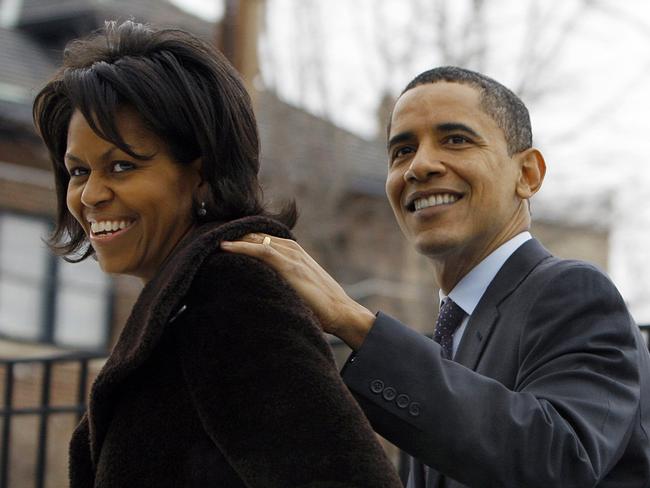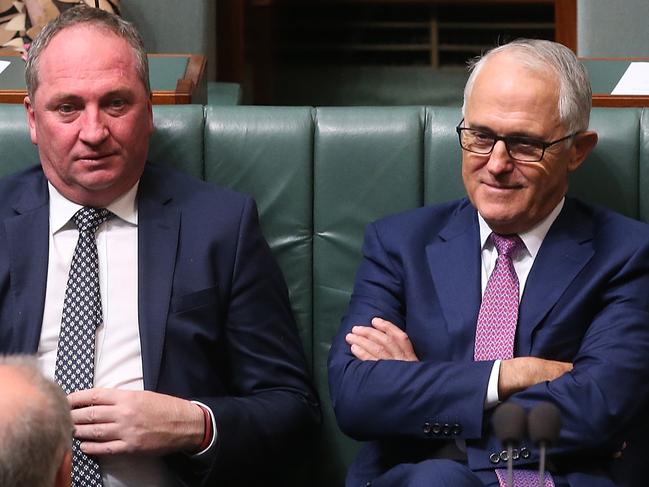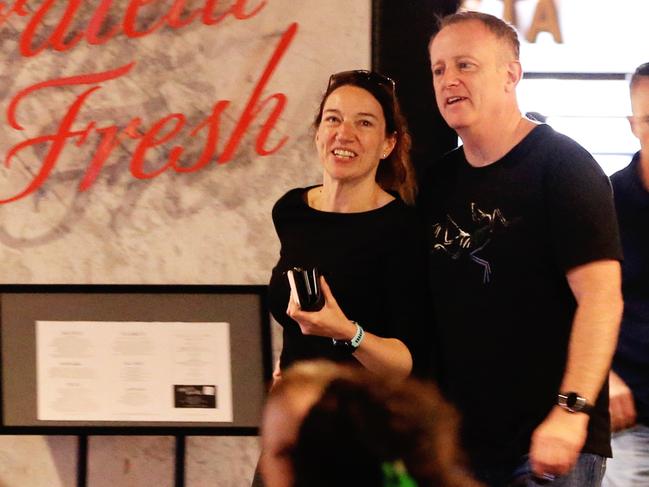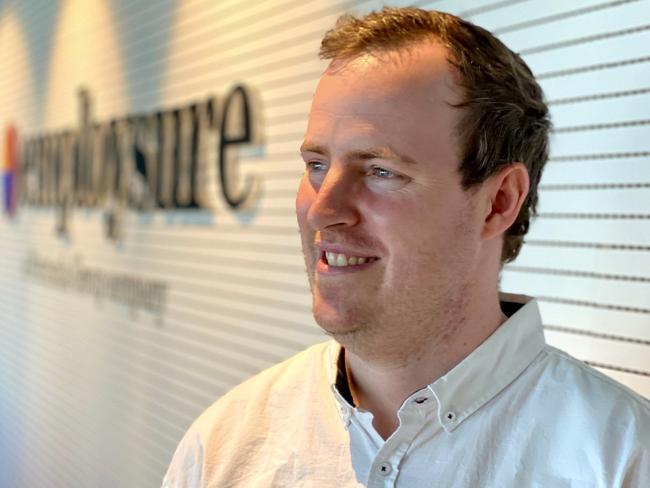How Aussie workplaces handle office romances, and what you should do if you’re in one
Lots of celebrities find love at work, but Australian companies have very different attitudes to the issue, with some wanting to know nothing about your private life, and others wanting to know everything. Here’s what you should know.
Work
Don't miss out on the headlines from Work. Followed categories will be added to My News.
From Barack and Michelle Obama, to Bill and Melinda Gates, and Hugh Jackman and Deborah-Lee Furness, there are plenty of examples of couples who first met in the workplace.
But office romances don’t always end happily ever after for the people or the companies involved, employment experts warned this week after McDonald’s ousted its global CEO for engaging in a consensual relationship with a subordinate.
Steve Easterbrook, who had been the fast food giant’s CEO since 2015, had “violated company policy and demonstrated poor judgment,” the company said in a press statement.
The company’s share price plummeted immediately after his sacking was made public, losing $4 billion in value.
A spokesman for McDonald’s Australia confirmed to News Corp that the company’s Standards of Business Conduct – the policy that Easterbrook violated – also applied to employees Down Under.
That document forbids staff from engaging in “unwelcome sexual advances, requests for sexual favours and other conduct of a sexual nature”.
The spokesman said the policy “exists to provide our employees and others who are part of the McDonald’s System with a framework to work in a positive environment”.

McDonald’s is far from being the first company to lose an executive over a consensual relationship.
CEOs from companies as diverse as Intel, Lululemon, Priceline, Boeing and Bestbuy have resigned or been pushed out after it emerged that they had been in relationships with staff.
Michael Wilkinson, a senior employment relations adviser at workplace consultancy Employsure, said banning relationships in the job environment was not realistic, reasonable or enforceable – and such a move usually had the effect of “encouraging the lovebirds to sneak around”.
But office romances “become especially complicated when the relationship is between a supervisor and a direct report,” he said. “The power imbalance can add a murky undertone to such a relationship, and as we’ve seen with the #MeToo movement, this kind of power dynamic can too easily stray into exploitation.”
But even fully consensual office romances between equally-ranked colleagues can cause problems for employers, he added.
“This can range from simply a drop-in productivity to conflict of interest, claims of favouritism, or an unwanted and costly harassment claim,” he said.

Research shows workplace relationships are surprisingly common.
A survey of 7780 workers commissioned by the US online jobs site CareerBuilder last year showed 36 per cent of workers had dated a colleague at some point – down from 41 per cent the year before – and nearly one third of the people who had dated a colleague (31 per cent) ended up marrying that person.
In Australia, the most high-profile example of a workplace that expressly forbids relationships is the federal government. Widely described as a “parliamentary bonk ban” when it was introduced by then Prime Minister Malcolm Turnbull in 2017, the edict only applies to the 43 people who are currently Ministers and Assistant Ministers, and interestingly does not prevent them from having sex with each other, or indeed the staff from other ministerial offices, should they so choose.
The Statement of Ministerial Standards simply decrees: “Ministers must not engage in sexual relations with their staff”.

University of Melbourne employment law expert Professor Beth Gaze said companies that forbade consensual relationships altogether could be “asking for trouble if they do have that absolute rule”.
“It’s a really difficult balance to strike. Situations can be so varied,” she said.
The issue was of particular concern to universities, where the supervision of students can raise concerns about nepotism and favouritism when relationships are involved, Prof Gaze said.
Queensland’s Griffith University is one academic institution that has looked at the issue, with a published policy that requires staff to “disclose an actual, potential or perceived conflict of interest arising from the existence of a personal relationship”.
But in many cases, Prof Gaze said, “Companies are better off targeting the behaviour that is of concern rather than the cause of that behaviour.”
Workplace relationships were a “really sensitive area” for a lot of companies, but “a lot of organisations are not giving this much thought at all,” Prof Gaze said.

RELATED NEWS:
The glass ceilings that women still face in Australia
Junie Morosi and the political staffers who became the story of the day
QBE boss John Neal seen with personal assistant Lucy O’Reilly
Australia’s most intriguing couples
Corporate sensitivity around these issues was evident when News Corp approached a range of high-profile Australian companies this week, asking them if they had policies relating to relationships between staff members.
Some companies declined to comment; others failed to respond despite repeated requests to do so; still others referred News Corp to their staff codes of conduct, which stressed avoiding conflicts of interest but had nothing to say explicitly about the issue of relationships.
A spokesperson for Woolworths said the company did not forbid personal relationships, but company policy stated “it is generally not appropriate to have someone reporting to them if they are in a close personal relationship”.
“If a close personal relationship starts between team members who are in the same reporting line, we expect them to inform their team leaders. This allows us to put in place measures to ensure any potential or perceived issues around favouritism or bias can be appropriately managed,” the Woolworths spokesperson said.
Similar comments came from Virgin Australia, which also does not forbid relationships between staff.
“Our approach in these circumstances is to facilitate appropriate amends to the working structure so as to best accommodate a personal relationship and a working relationship between the employees,” the Virgin Australia spokesperson said.

The Australian Public Service addresses the issue in its staff conduct policy, which states: “While it is not uncommon or wrong for couples or other family members to be working in the same agency it is not usually appropriate for one to have any line responsibility over another.”
It was more common for companies in the finance and banking sectors to have directly addressed the issue in their staff conduct policies.
ANZ requires employees “to disclose close personal relationships in instances where the relationship may present a conflict of interest” while Macquarie Bank stipulates that employees “disclose personal relationships that may have potential adverse impacts on the working environment or Macquarie’s commercial relationships or reputation”.
QBE is even more upfront in its Code of Ethics and Conduct, which insists employees disclose “close personal relationships with other employees where there are direct reporting lines (and) real or possible conflicts between roles and responsibilities”.
Disclosure must be made to both an employee’s manager and the company’s compliance team and included both short and long term intimate or romantic relationships, the QBE code states.
The company penalised boss John Neal more than half a million dollars in 2017 for taking too long to disclose a relationship he had commenced with his personal assistant, who left the business.

Putting the onus of disclosure on employees who have commenced a relationship with a colleague could create difficulties, and many people would find it intrusive, Prof Gaze said.
“That’s a tough one. The question is when is it enough of a relationship? These things have degrees and grades,” she said.
But Michael Wilkinson from Employsure suggested disclosure was often in the employee’s best interest.
“Even if your workplace has a more relaxed attitude to workplace romance, it’s in your best interests to consider if your romantic relationship impacts your work duties or represents a conflict of interest,” he said.

When deciding whether to disclose, he said, the first step was to check whether the company had a policy on the matter.
“If there is a policy, then you should act in accordance with that policy. If there is not a formal policy, then you should consider the impact of the relationship on your role and make an appropriate decision,” he said.
“(But) as we know, company policies and procedures aren’t much good if no-one knows they exist. This is where onboarding, training, and employee handbooks are especially important, so all employees are aware of company policies, and the official position on workplace romantic relationships.”
Originally published as How Aussie workplaces handle office romances, and what you should do if you’re in one
